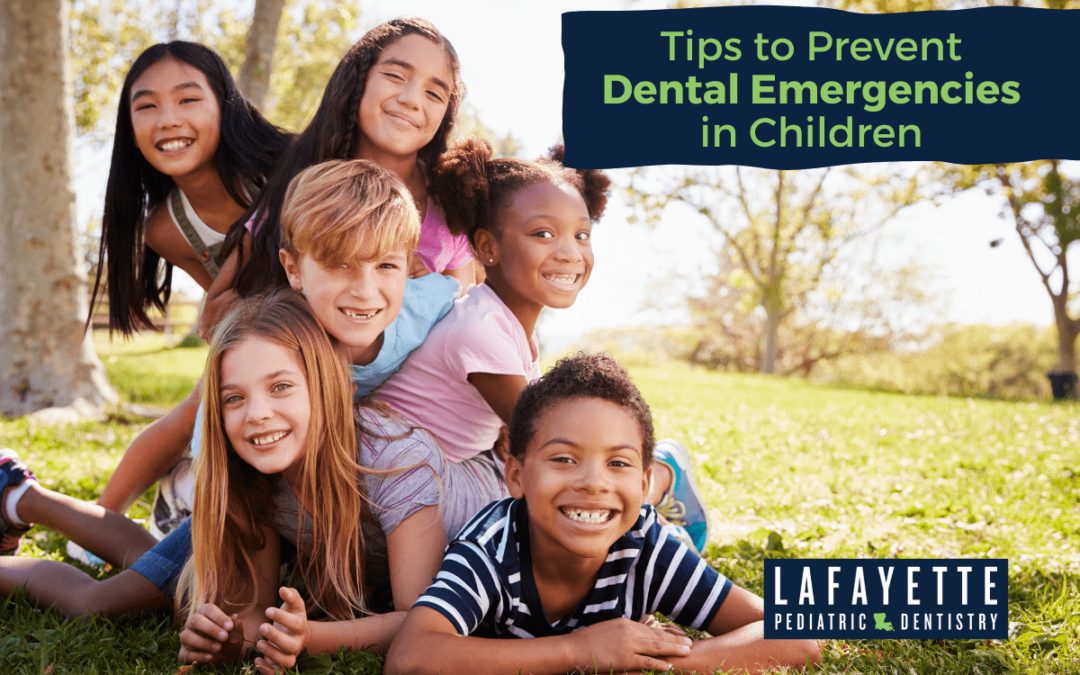As summer approaches, children are eager to spend more time outdoors and engage in physical activities. Unfortunately, this also increases the risk of unexpected dental emergencies. It’s important for parents to be prepared and know what to do in case of a dental emergency. By taking precautions and being aware of potential risks, families can enjoy a safe and fun-filled summer.
5 Tips for Preventing Dental Emergencies in Children
Accidents happen, especially when children are involved in physical activities. Unfortunately, these accidents can sometimes lead to dental emergencies such as chipped or knocked-out teeth. To help prevent these mishaps, it’s important to take certain precautions. Here are some tips to keep in mind:
Ensure Your Child’s Teeth are Protected During Physical Activities
The risk of dental injuries and emergencies increases during physical activities, especially in high-impact sports such as football, hockey, and basketball.
Mouth guards are essential for protecting your child’s teeth and mouth during sports or recreational activities. By creating a barrier between their teeth and any potential harm, mouth guards can prevent serious injuries.
Whether your child is playing football, basketball, or any other contact sport, make sure they wear a mouth guard to keep their smile safe.
You can learn more about mouthguards in our previous post which will help you determine if your child needs one.
In addition to mouthguards, helmets and other protective gear can also help prevent dental emergencies and ensure that your child can enjoy their favorite activities in a safe environment.
Childproof the Home
The importance of preventing dental emergencies in children does not just apply to sports and recreational activities, but also at home.
Below are some safety measures you can implement to ensure a safe home environment:
- Secure hazardous objects, such as furniture with sharp edges, exposed cords, and small items that can be easily swallowed or present tripping hazards.
- Install gates at the top and bottom of stairs if you have younger children, and closely supervise your child whenever they are using the stairs.
- Install safety locks on cabinets to prevent access to potentially dangerous household items.
- Place non-slip mats and padded faucet covers in the bathroom to reduce slippery surfaces that can lead to falls and dental injuries.
- Discard or repair damaged toys. Younger children tend to bite or gnaw on objects, and damaged toys, particularly those made of hard plastic can develop sharp edges.
Prevent Accidents
Accidents and injuries can occur in any environment. Make sure that your child doesn’t run around with pointed objects in their mouth, such as pencils or toothbrushes, as these can result in dental injuries if they were to fall.
Don’t let your child use their teeth as tools for opening or cutting things. Instead, encourage them to use appropriate tools, such as scissors (under adult supervision), and encourage them to ask for help when needed.
Supervise Playtime
Playtime with other kids or siblings is usually enjoyable, but sometimes it can get too rough. Closely monitor rough play and intervene when it gets out of hand to reduce the risk of accidents that may result in dental injuries.
It’s also important to provide age-appropriate toys to establish a secure play environment. Choosing toys that do not pose a risk to their oral health, such as those without sharp edges or ones that won’t break, will help protect their teeth and gums.
Establish Good Oral Hygiene Habits
Preventing dental emergencies in children involves more than just accident prevention; it also entails establishing good oral hygiene habits. Parents play a vital role in instilling these habits, which include:
- Proper brushing. Make sure your child spends at least two minutes brushing their teeth twice a day using a soft-bristled toothbrush and fluoride toothpaste.
- Regular flossing. Flossing helps maintain healthy gums and prevent plaque buildup between teeth.
- Mouthwash. If age-appropriate, mouthwash can provide an extra layer of protection against cavities and gum disease.
- Routine dental check-ups and cleanings. Regular visits to a pediatric dentist allow for monitoring of your child’s oral health and addressing potential issues before they escalate into emergencies.
Dental Emergency Preparedness
While prevention is key, being prepared for dental emergencies in children is equally important to ensure prompt and effective care.
- Create an emergency dental care kit that includes essential items such as gauze, a small container with a lid to store a knocked-out tooth, a cold compress, a pain reliever, an oral antiseptic, a dental mirror, and dental floss.
- Familiarize yourself with the appropriate steps to take in case of a dental emergency, such as how to handle a broken or dislodged tooth. Knowing what to do in these situations can make a significant difference in the outcome. We’ve put together our advice on how to respond if dental emergencies occur to help you navigate common scenarios.
- Keep the contact information of your emergency pediatric dentist accessible. Save their number in your phone and post it on a sticky note on the fridge or in a visible area of your home. In any dental emergency, contacting a dentist for immediate assistance should be a top priority. They can provide expert guidance and arrange for urgent treatment if necessary. In the case of an emergency, please call our 24/7 emergency line at (337) 443-9944.
While accidents can occur, following the above preventive steps should help reduce the likelihood of needing treatment from an emergency pediatric dentist.
When it comes to finding the perfect kids’ emergency dentist in Lafayette, LA, look no further than Lafayette Pediatric Dentistry. We understand the anxiety that sudden oral issues can cause, and we are committed to providing timely care while prioritizing convenience and comfort for you and your little one.
Don’t take any chances with your child’s dental health. Contact us if you need assistance or if you have any questions about pediatric dental emergencies or request an appointment!
Source:
